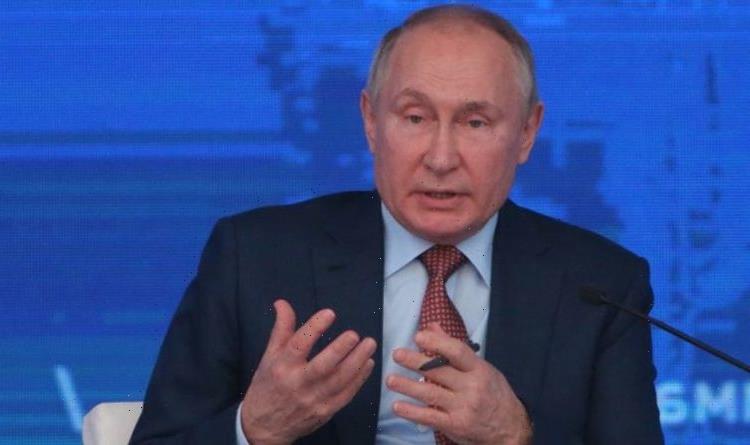Putin given 'vast power' over European economies says expert
We use your sign-up to provide content in ways you’ve consented to and to improve our understanding of you. This may include adverts from us and 3rd parties based on our understanding. You can unsubscribe at any time. More info
Prices again reached record highs in both the EU, as well as the UK, after Russia reportedly decreased gas deliveries to Europe, just after it looked like pressure on supplies and prices was starting to ease.
In the UK, prices skyrocketed to 470p per therm yesterday, which beat October’s 407p record.
This comes just days after Mr Putin looked to have caved to the EU’s sanction threats by booking last-minute capacity on a pipeline to ship extra gas to Germany via Poland on Friday.
While that appeared to have eased prices, it was only short-lived, as gas flow into western Europe appears to have been dropping since Saturday.
Mr Putin is no stranger to restricting Europe’s flow of gas.


But the renewed gas squeeze saw EU supplies slashed when the Yamal Pipeline, which brings Russian gas to Germany, switched to flow east.
The Russian President has been accused of deliberately withholding supplies due to Europe the political tension with Ukraine and the delays over the certification of Nord Stream 2, another Russian pipeline.
But the Kremlin has denied that there is any politics involved with Russia’s state-owned gas conglomerate, Gazprom, and its decision to cut gas deliveries.
When asked about the connection between Nord Stream 2 and the Yamal-Europe pipeline, Kremlin spokesman Dmitry Peskov responded: “There is absolutely no connection, this is a purely commercial situation.”
Russia’s move has now forced France to fire up plants with heavy fuel oil to reduce pressure on its energy grid.

Gas price rises has also force the cost of electricity to surge.
France saw the price of buying electricity soar to €1000 (£849.36) per megawatt-hour, and now investors fear that the situation will worsen over the winter months as an energy crisis looms.
Now as winter comes upon us, with demand expected boost while gas reserves remain low, forward prices for 2022 and winter 2022-2023 has skyrocketed as experts have tipped that the crisis could go on for years.
Investec analysts have warned that these soaring costs could lead to boosted energy bills for millions of British households, with fears that even more energy suppliers could go bust.
The analysts put the blame on a mix of low storage levels in the EU, poor weather conditions which have made renewable technology less effective, and the recent energy squeezes which includes both Mr Putin’s move but also French nuclear shutdowns.
DON’T MISS
Solar storm warning: Two major solar flares to be fired from Sun [REVEAL]
Pompeii breakthrough as remains of ‘vaporised’ man found [REPORT]
Putin caves as EU checkmates Russia [INSIGHT]

They also argued that Germany phasing out nuclear power was ramping up energy prices.
Nathan Piper, head of oil and gas research at Investec, warned: “We believe this is not just a price spike.
“There is a high likelihood of both prolonged and even higher gas prices through winter with an impact that stretches over the next two years.
“This has implications for major users of gas, including fertiliser producers with a follow-on impact on food costs.”
And this comes after the broker warned that the energy price cap, which is the maximum tariff that an energy supplier can charge customers, could rise to £2,000, which is up £700 from the current price.
This would mean that British households would be charged an extra £60 a month.
While the UK does not directly receive gas from Russian pipelines, the decreased supplies in Europe does cause prices to ramp up in the UK as well.

That’s because gas is an integrated market, and Britain does important some Russian gas via the Netherlands too.
And the Government has been slammed for not building up enough spare capacity of gas, leaving the it highly exposed to international markets.
That is why Britain has been scrambling to avert a crisis.
Fuel imports from non-EU countries spiked by 23.8% to £1 billion in October.
The Office for National Statistics said the spike was mainly down to an increase in shipments of gas from Norway, which Britain is reliant on as a trading partner.
Norway is responsible for over 60 percent of the total gas demand, making it less reliant on EU gas, which is largely controlled by Mr Putin.
Source: Read Full Article
